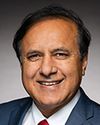Yes, there is differential treatment on this aspect for the different employment streams by the feds and the provincial governments. Once a provincial government nominates a person for a work permit to come to Canada and join an employer, the feds take about two years before they finalize their decision on the work permit. Let's suppose there's an applicant from India. There's a refusal rate of about 83% in the New Delhi office. But if a person or an applicant is applying from Australia, the refusal rate is only 34%, as I mentioned in my opening remarks.
There is differential treatment. This is affecting not only the Canadian economy but also our economy in Saskatchewan, at home in Saskatoon. Employers are unable to find the employees they need for justifiable employment, and they want to grow their businesses.
So there are different ways, but the federal and provincial governments need to coordinate with international offices on how they can overcome the gap in processing times. There's a huge gap in how they treat these different applications.



